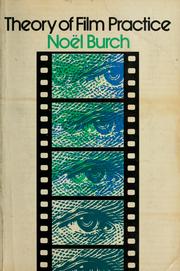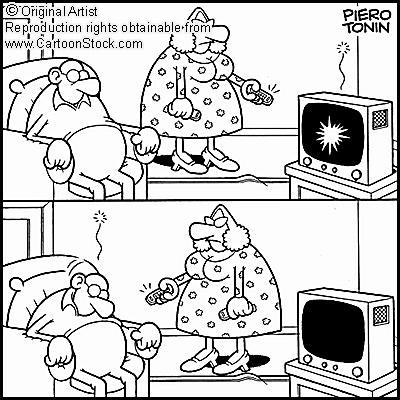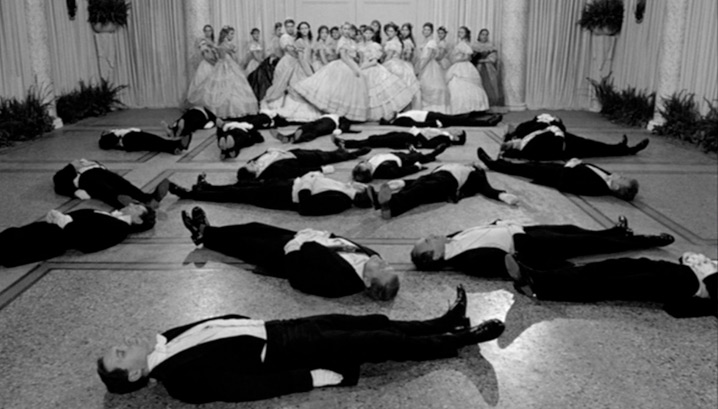This book review appeared in the Winter 1974/5 issue of Sight and Sound. For illustrations, I’m including a contemporary photograph of the author, Noël Burch (seen here in Rotterdam with the late Allan Sekula) and two stills from Burch’s first and (probably) best film, Noviciat (1964 — only 18 minutes long, but including illustrations of a remarkable number of the formal procedures described in his book.
Shortly after this review appeared, I recall receiving a gratifying fan letter of sorts from James Leahy, a teacher at the Slade School in London and a devoted Burch disciple, at least at the time. — J.R.


THEORY OF FILM PRACTICE
By Noël Burch
Translated by Helen R. Lane
Secker & Warburg, ₤3.50 (paperback, ₤1.90)
“Theory of Film Practice is at every point derived from and confirmed by the perception that film develops not through the contraints and coventions of an industry, but in opposition to them.” Thus Annette Michelson, in her exemplary introduction to this revised and updated English edition of Praxis du cinéma (1969), sets forth one salient fact about Noël Burch’s seminal work that clearly isolates it from the critical mainstream as we know it today.
There are many others: a total rejection of the illusionist principle which was expanded in depth by André Bazin (more precisely, extended into deep focus), and has subsequently been adopted as an unexamined postulate by most of his epigones; a ‘scientific’ approach that rigorously eschews journalism, sociology, literary analysis and the promulgation of moral concerns, however much it reflects Burch’s own aesthetic predilections; above all, an obstinate insistence on regarding films as sounds, images and the formal relationships between them. Read more

A reorganized and self-regulated Hollywood bounced back in 1935, but times were different then. Movies were America’s universal culture. Now, they’re not even close. Like then, the technology is changing—-but in a far different way. Movies are expendable. Folks will give up $12 tickets, cancel Netflix, and cut cable to save their high-speed Internet connection. With the president’s fireside chats posted online, the new Hoovervilles will certainly have broadband. Is there a downsized future for Katzenberg’s product? As one bankrupt mogul said to another, “YouTube?!”–J. Hoberman, “Why Hard Times Won’t Mean Good Times at the Movies Again,” The Village Voice, February 3, 2009
Average number of hours of television watched per week by Americans aged 43 to 61: 19 Average number watched by those aged 26 to 42 and those aged 14 to 25, respectively: 15, 11–“Harper’s Index”, Harper’s Magazine, March 2009 [2/13/09]
 Read more
Read more
Written for the BFI DVD release of The Gold Diggers in 2009. — J.R.
A quarter of a century after its initial unfriendly reception, it’s worth puzzling over why a film as beautiful, as witty, as imaginative, and as brilliant as Sally Potter’s first feature could have given so much offense to certain spectators in 1983. The recoil was so unforgiving in some quarters that Potter, after touring extensively with the film, came to seriously question it herself — or at least the wisdom of having made it, insofar as it was already threatening to end her ambitious career in filmmaking almost before it had properly started, thereby eventually persuading her to withdraw the film from circulation. (By contrast, the exceptional success of her 34-minute Thriller in 1979, an unpacking of Puccini’s La Bohème, made with many of the same collaborators — most notably Colette Laffont, Lindsay Cooper, and Rose English — had clearly heightened her expectations.) Now that it’s belatedly becoming available again on DVD, it’s more than entitled to a fresh look — including a consideration of what originally perturbed some people about it.

Even after one totes up all of the most obvious of the possible objections that could be raised against The Gold Diggers — boredom, anti-feminist backlash, envy of other independent filmmakers for Potter’s lavish funding from the National Film Board, pretentiousness, allegorical and metaphorical density, sheer difficulty (as Ruby Rich, a sympathetic analyst, put it in her 1998 book Chick Flicks, `Its commitment to narrative [is] minor’) — the inability or refusal of many viewers to grasp or even notice The Gold Diggers’ no less obvious and unassailable strengths continues to confound me. Read more





